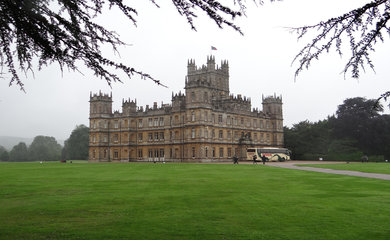Downton Abbey has returned to the airwaves in the United States at last, much to the delight of the show’s rabid fans from coast to coast. But what does it have to offer with its fourth season? Downton seems to be in a bit of a freeze-thaw cycle, and it’s not clear how long the whole thing is sustainable.
I like looking at pretty costumes and historical inaccuracies as much as the rest of them, but Downton in 1920 has entered a period of stasis. Can Julian Fellowes and company keep coming up with fresh material, or is it time to mothball the manse?
Season four opens six months after the death of Matthew Crawley, with Lady Mary and Isobel Crawley both determinedly wallowing in grief; evidently, we’re supposed to feel rather contemptuous of them for ‘lingering too long in the world of the dead’ when there are things to be gotten on with, like the inevitable financial crisis facing the manor, an old friend from Carson’s past, and Rose’s heel-kicking antics in the village. (Attending a community dance! Daring to take a turn around the dance floor with an undergardener! SHOCKING.)
The endless series of financial crises facing Downton are, to be honest, getting rather old. While they may be an accurate depiction of the time, when the great houses were struggling to survive in a changing financial landscape, they’re tiresome to endure when they keep happening over and over again. And I find myself able to muster little sympathy for the wealthy in general, but especially in economic times like these.
As Lord Grantham blusters about the death taxes, I think of the people around the world suffering under the present economy who don’t have the kinds of financial options the Granthams do. We can’t just sell off land to settle financial obligations, we don’t live in massive manor homes with fleets of servants, we don’t wear an endless series of frocks and jewels and entertain at mammoth multi-course dinners. Their idea of ‘scrimping’ and ‘making do’ is so alien to many of us as to be borderline insulting.
While initially serving as a fascinating look at class, Downton has turned out to be a more pedestrian presentation of benevolent overseers kindly dispensing jobs and wisdom to the piteous lower classes. Instead of being a class commentary, Downton serves as a reinforcement that some people are just born wealthy and we ought to support them in that, and it’s really quite unjust when people go about trying to take all their nice money away. After all, it’s not like someone else could use it more appropriately or effectively.
We were even treated to a touching scene where Cora dismisses the nanny after catching her being cruel to Sybil’s daughter (a “half-breed,” according to the nanny, because of her father’s origins). I gather that we are supposed to see Cora and the family as progressive after this little display, for so kindly welcoming a child of mixed class origins into the family and firmly demanding that she be treated as an equal to her cousin. But really? It just felt very stagy and obvious.
Fortunately for the manor’s impending financial doom, Carson and the Dowager Countess manage to bully Lady Mary out of her grieving period and she takes up the reins with a vengeance, asserting control and refusing to allow her father take over management of her share of the estate. Mary and Matthew discussed progressive plans for modernising before his death and she intends to carry them on, we learn, even as her father stomps about, embittered by the fact that a girl plans to manage financial issues. (And by the fact that Matthew’s fortuitously discovered will had ‘testamentery intent.’)
Thus we are reminded that even the indulgent kindly head of the manor who loves dogs, children, and the lower classes has to set the limit somewhere, and it’s definitely at women. He might think the women in his life are lovely, but they’re there for ornamentation and looking at, not for activities like thinking and taking an active role in the management of the home.
Meanwhile, we’ve got a side plot with Carson’s old friend turned enemy after stealing Carson’s girl (the nerve!) and Rose chafing at her upper class restraints at Downton, with the usual tomfoolery downstairs. In other words, life at Downton continues much as usual, in its standard, soapish way, lurching from one crisis to the next and surrounding the characters with nothing much of interest.
There were rare gems in the opening episode of the season, like the moment when Mrs. Pattmore stands in the kitchen dejectedly, defeated by an eggbeater, and cries at the thought that she and her kind will be replaced by machines. Daisy’s adeptness with the device and eager embrace of it is a warning knell of changes to come in manor homes and across Britain, a nation that was slow to adopt domestic appliances initially in no small part because of the long history of maintaining servants and staff.
Eventually, though, vacuums and egg beaters and washing machines and more entered even the most traditional of British homes, changing the way people belowstairs lived and worked.
Can Downton Abbey break out of its cyclical ‘everybody panic over finances, no, it’s all right now’ plotting and storytelling? For surely there is much to tell about this era, and I’d like to see it.
Photo by Garyembridge, licensed under a Creative Commons Attribution 2.0 Generic license


With great expectation our little love it/watch group couldn’t wait for the debut of season four. Perhaps our hopes were too high as almost to a person we voiced disappointment. What happened to the wonderful writing of the first three seasons ? Have the writer(s) been replaced by those from Days of Our Lives ? Alas, maybe there’s still hope to continue a great show as this season progresses.
Ed in Boulder, CO